Episode 6: Tradition and modernity in African cultural philosophy
Scarlett Whelan (Mst African Studies) and Kei Patrick (BA Philosophy and French) interview Prof. Frederick Ochieng’-Odhiambo (University of the West Indies) and Zeyad el Nabolsy (Africana Studies, Cornell), on attitudes to tradition, modernity and modernisation in the work of two African philosophers: Amilcar Cabral and Henry Odera Oruka.
This episode aims to prepare listeners them for engagement with turn 2 of oxford public philosophy, by introducing some themes of modern Africana philosophy. We first raise and dispel some common meta-philosophical concerns about Africana discourses, and consider epistemic differences between the African and European traditions.
Diving into some approaches to particular philosophical traditions, Prof. Ochieng tells us about Kenyan philosopher Odera Oruka: his concept of philosophic sagacity, and his project of developing a truly authentic national culture, which would protect Kenya from harmful foreign practices and ideas.
Unpacking the idea of authentic national culture, we bring Oruka into conversation with cultural philosopher Amílcar Cabral. Cabral broadly endorsed an anti-essentialist, historicized conception of culture, and saw cultural liberation in terms of cultural autonomy as opposed to the preservation of indigenous cultures. Zeyad provides us with a useful distinction between cultural influence and cultural domination, which we apply to some common discussions about tradition and cultural development in Africa.




